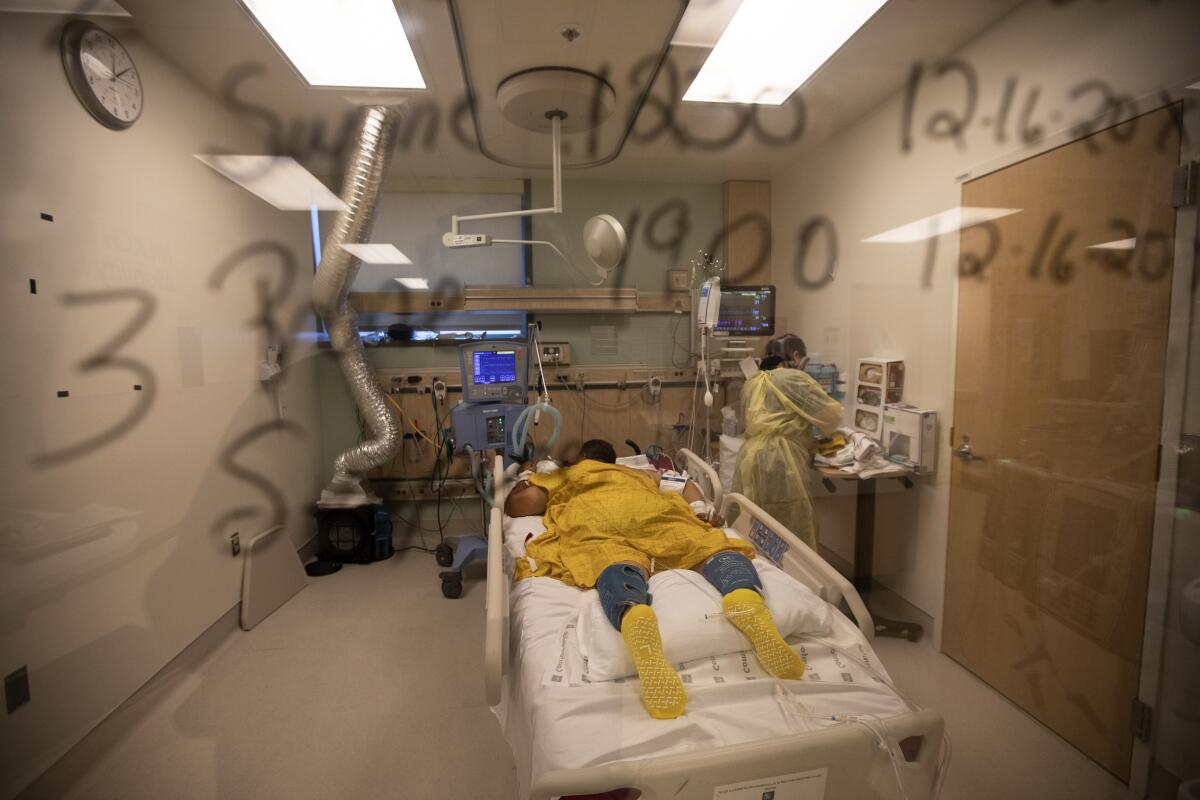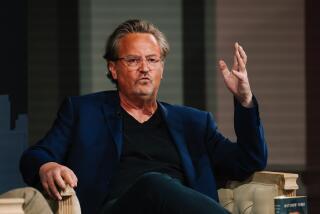The surreality of a ‘Prohibition’-style dinner as ICU availability hits zero

- Share via
The other day, I saw two headlines right next to each other on the L.A. Times website that made my head hurt.
The first was an up-close look at overwhelmed hospitals around Southern California bracing for a post-Christmas wave of COVID cases, describing hospitals running out of oxygen they need to keep people alive, patients waiting up to eight hours in ambulances before entering the emergency rooms and doctors making impossible decisions about which terminally ill patients will receive care.
The second was a story about an indoor, “speakeasy”-style New Year’s dinner being organized by the Beverly Hills restaurant La Scala. The restaurant slipped invitations into takeout bags that encouraged diners to “keep this discreet, but tell all your friends.”
The articles seemed to describe worlds in direct contradiction. One story described a group of incredibly brave people facing down the terrifying, lethal reality of the pandemic.
The other was an unapologetic, even playful, attempt to escape from that reality. To the organizers of the dinner, the pandemic is occasion dining, so distant a threat that its terrors were simply an edgy backdrop, the source of a fun “prohibition” vibe.
“Surreal” doesn’t even begin to describe the feeling. It’s painful, enraging and deeply troubling to see all these realities, all interacting with each other in contradictory and cruel ways. At the end of the year I find myself with two questions: How did we get here, and where do we go from here?
I could argue that a schizophrenic public response is the natural result of terribly constructed policies that seem designed primarily to protect politicians from responsibility and blame rather than keeping people safe. It’s also true that the miscommunication of the virus’ danger during the pandemic’s early stages was a fatal mistake that can’t be unmade. A chaotic political discourse made scientific reality a matter of ideology, and many of the ruinous policies that emerged catered to industries and corporations, showing us just how little value a human life is worth.
But in truth, I don’t believe that the behavior of institutions and leaders and corporations are the only source of this growing feeling of surreality I’m struggling to describe. La Scala’s dinner organizers aren’t the only ones trying to escape the pandemic’s reality. Regional ICU availabilities are at zero, yet the malls were full of Christmas shoppers last week. Coronavirus kills someone every 10 minutes in Los Angeles County, but at least there are NFL and NBA games on TV, and families are getting together for the holidays.
Social media and its distorting algorithms have always allowed us to construct our own factual and social realities. But in a pandemic, when these realities contradict, people die. This is happening as the isolation and psychic toll of quarantine also forces us to turn away and cultivate private happiness, to even ignore the pandemic, for a moment, if we are privileged enough to do so.
What’s unprecedented about this crisis is the fact that our ability and desire to dissociate from our painful reality may have hurt our response to it. Things aren’t normal, yet we have all desperately sought normality. We have tried to live life, even knowing that life creates disease vectors.
And it’s not just a contradictory factual reality we try to escape from — it’s also a contradictory moral reality.
A few days ago, as ICU availabilities hit zero, I ordered from a local Jamaican restaurant on Uber Eats, and an older woman brought a plate of curry goat and red beans and rice to my doorstep. I tipped well, but it did not ease the guilt that I might have created multiple disease vectors with my laziness. There are multiple pandemics, and I live in the one where people are made comfortable by paying others to take risks for them.
In one moral reality, what La Scala did is detestable and I can comfortably condemn them. But I also can’t help but think of the desperation of people running restaurants right now, how no help is coming, and how I cannot judge what that desperation would make me do because I’ve never experienced it.
Take my patronage of takeout places: I might be forcing some employees to continue working in unsafe conditions with this order, but I may also be helping to keep the restaurants afloat and generating essential income for a delivery driver.
Where do we go from here? As I’ve said before and will continue to say in this column, I don’t have all the answers. But in a world of multiple factual and moral realities, I think we have to learn to see each other with compound vision, and in every way we can, push the borders of our awareness beyond what’s comfortable. We need to form and maintain our own connections to reality outside social media.
Our information ecosystem today hardly resembles an “information superhighway” or “World Wide Web” — it’s more like an open world video game, where the player embodies a character that interacts with a vast, continuous environment. The player believes they are experiencing a complete world, but in reality, the game renders the images, environments and textures only in the player’s limited field of view.
What you see is decided by lines of code, and no matter where you turn, the only part of the world that exists is what’s directly in front of your face.
More to Read
Sign up for Essential California
The most important California stories and recommendations in your inbox every morning.
You may occasionally receive promotional content from the Los Angeles Times.











